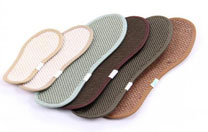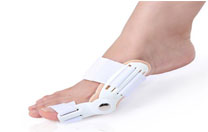Plantar fasciitis is a common cause of heel pain in adults. Pain is usually caused by collagen degeneration (sometimes referred to as "chronic inflammation") at the origin of the plantar fascia of the medial calcaneal tubercle. This degeneration is similar to ischemic chronic necrosis. It is characterized by loss of collagen continuity, increase of connective tissue matrix and blood vessels. Fibroblasts are usually seen in acute inflammation of tendonitis rather than inflammatory cells (1). The degeneration is due to repeated microtearing of the plantar aponeurosis and beyond the ability of self-repair.
Typical symptoms of plantar fasciitis are that the most severe pain occurs in the first few steps of the morning, but not happening in every patient. Patients often notice pain at the beginning of activity, which can be alleviated or subsided as they warm up. Pain may also occur when standing for a long time, sometimes with stiffness. In more severe cases, the pain worsens at the end of the day.
The plantar fascia is a thickened fibrous aponeurosis originating from the medial tubercle of the calcaneus and extending forward into the longitudinal arch of the foot. The function of plantar fascia is to provide static support and dynamic shock absorption of longitudinal arch. Individuals with pes planus (low arch or flat foot) or PES cavus (high arch) have an increased risk of plantar fasciitis.
Dongguan Zhiguo products have
metatarsal pads plantar fasciitis, welcome to buy.



